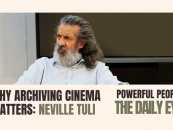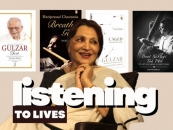-853X543.jpg)
Making films is my coping mechanism: Shabnam Sukhdev
by Vinta Nanda January 6 2022, 12:00 am Estimated Reading Time: 14 mins, 9 secsHere’s Vinta Nanda in conversation with documentary filmmaker Shabnam Sukhdev, who just completed her short film titled ‘Unfinished’ while completing her Masters in Fine Arts from York University, Toronto.
We had a couple of long conversations about her film, and when writing, I find it’s impossible to separate Shabnam Sukhdev the woman, from the film she’s made with material archived by her, during the endless months of lockdowns.
The word ‘unfinished’ defines her; as I see it, and she echo’s what I say: “I’m a Work In Progress”. This is her lived experience. In the process of making the film, she bravely provided vocabulary to one of the most stigmatized issues of our times: Mental Health.
I saw the film twice without a break. More than an hour long, it is about her relationship with her daughter Isha, and she tells the story in a path breaking form – we’ll talk about that as we go forward.
It touches a chord. It informs you that Shabnam is fine and so is her daughter - and that after you’re done watching the film, you too will be as fine as they are. Fact is, there isn’t another film I’ve seen with such nuanced interactions between a mother and daughter. The pendulum here oscillates between troubled and still waters. And it connects with you in such a sublime way, that their turbulence is your autobiography as much as it is theirs.
When I met her, she was more concerned about the low lighting in my room (we were on a Zoom call) and didn’t like that she wasn’t able to see my eyes. I told her that her film had been cathartic for me. The conversation wasn’t supposed to be about me but she had the questions and it took a massive effort for me to shift the focus back to her. Guess being the documentarian she is, Shabnam makes you ‘the subject of the moment’ by default.
6.jpg)
I also told her how I had been searching for uncomplicated and non-academic vocabulary to express the several incomprehensible ups and downs in my life and it is her film that has finally given me the language and the metaphor, which no journal or discussion between accomplished psychiatrists and experts, that keep running across media, have been able to achieve.
Isha, Shabnam’s thirty-one year old daughter, made me fall in love with her. She’s the protagonist of her mother’s film and the two of them let the decipherment of what they’ve gone through be fluid and easy to watch. Both of them are lucid and their honesty illuminates the conflicts that even we deal with from time to time.
The scenes from the film that stay are those when Shabnam is driving Isha to the hospital because they need help – their internalization of the problem is clearly visible in the acceptance of the inevitability of what is happening to them.
It is heartbreaking yet endearing. The exchange between them while they drive to the facility is matter-of-fact: what needs to be done must be done. Shabnam inter-cuts the drive to the hospital with archived footage she has captured during some of Ishaa’s struggles. She filmed what Ishaa went through, primarily for the doctors to understand what was happening to her, not knowing that there’d be a day COVID would strike and push us into prolonged months of lockdowns when the material she had archived would become a powerful film.
It takes courage to confront what Isha has gone through. The intense need to overcome the problem is what pushes this mother and daughter to keep searching for a solution - it’s all there in the ‘realness’ of these two extraordinary people.
Am I thinking right, I ask Shabnam? “It wasn’t exactly a place we had arrived at by design”, she answers and corrects me, “It wasn’t courage that was driving us - it was a tipping point, which we needed to acknowledge. It was Isha who was fighting, she’s a survivor, I was doing what, to my knowledge, needed to be done”.
I differed, because it is audacious to fight depression, it takes tremendous strength to swim when you are drowning. The only way out of despair is to defy it, know? “No, it isn’t courage. It’s the need to survive that stops you from sinking. You know that ‘this too shall pass’ and then there is hope of better times to come”.
10.jpg)
Shabnam informs me that Isha fights her battles by using her art. She’s a talented dancer. And she also loves being around children, so she teaches at a nursery school - dancing and being with children help her cope. “It’s a tightrope for both of us, between Ishaa’s episodes and a life that needs to be lived normally. We’ve got used to it and we’ve found our own way of balancing things”.
Unfinished is made by both of them, Shabnam tells me. Uncertainty during the COVID months has made it happen. A thought crosses Shabnam’s mind while she is saying that to me and trails her off into thinking aloud, “What if I’m not there tomorrow? Who will Isha lean on when she needs help? Unfinished is a mirror for her to look at when she’s searching for answers after I’m not there with her”. Both of us crack up over her getting serious about life and death, but I understand that she is expressing concerns, which all mothers have for their daughters.
Shabnam was married to a famous Bollywood producer and director when she was straight out of college and Ishaa was born a year later. When Isha was one, she went to the Film and Television Institute of India (FTII) Pune to study film direction and left her in the care of her husband and her own mother who had moved into their home.
Four years later, life had changed for Shabnam and her husband.
While she had discovered what she wanted from life, her husband had fallen in love with someone else. They parted ways, and for Isha, it was a second upheaval at the tender age of five. To be a filmmaker and a mother to a little child, and to be living alone, was a difficult phase. Sending Isha to boarding school became necessary so that she could get a firm footing in life. Later Isha moved to another school - this time in the Sahyadri Hills, where Shabnam, missing her because she was alone, went to teach for a few years.
It is here Shabnam met the man she is happily married to now. They decided to leave India and move to Canada. And during the most impressionable years of Isha’s life, Shabnam was making films, which involved traveling for long periods of time.
Earth Crusader, a film about the architect Didi Contractor is one of my favorite films from her repertoire. And The Last Adieu, a film she’s made about her father, India’s renowned documentary filmmaker S Sukhdev, is riveting. Today Isha is writing a book – chronicling her life so far to understand what she’s been through.
Unfinished is a masterpiece indeed. Where does Shabnam plan to take it from here? “No idea!” But the film must be seen, I tell her, to which she answers, “One needs funds to take the film to festivals and it is a humongous task to have a film distributed in these times”.
10.jpg)
What also works for the film, other than the texture it gets from footage shot on different formats and across so many years, decades you can say, is the editing. You’re on an emotional roller coaster with Shabnam taking you back and forth in time. It makes you breathless, but there is a method here, which makes the experience comforting. The film is seamless.
She tells me, “I cannot help but keep on filming. My diploma film at the FTII didn’t see the light of day and I’ve lived with the fear ever since, that my films will not reach their audiences”.
I ask her why her diploma film was shelved. “I think it was too forward an expression for those times. It has scenes of Lesbian oppression and the authorities didn’t want to deal with it. They didn’t even allow me to subtitle it, and put it in the freezer. The film wasn’t sent for competition either, but the good thing is that I managed to get a copy. I’ve actually used some of the footage from there in Unfinished?”
Most women filmmakers deal with similar problems right? “We are called feminists and the word feminism is considered to be a bad word”, says she. “When we want to express our truth, projects are hijacked or shelved. What doesn’t fall in line with the way ‘men believe’ women ‘should feel’ is buried because most decision making done here is by the men”.
So what then makes her tick? “My strength is in being unafraid of my own vulnerabilities? I have a strong sense of ‘I have nothing to lose’. Filmmaking is an antidote. It doesn’t matter to me if my films reach audiences or not, as long as I get to make them. With every film I overcome something. I’ve crossed one more hurdle in my life”.
Does the journey of a filmmaker have a destination? The stories, characters and genres of each film are diverse but there is always a common thread that traverses the filmmaker’s work. “Until the concern a filmmaker is born with finds resolution, the desire to keep searching remains, and that reflects in all her work I suppose,” she reflects.
7.jpg)
I also ask Shabnam if she’s ever lived on the edge and she says, “No! I’ve always walked away from things that disturb me. Canada, too, was one such decision. Life is very different here. It isn’t as though I’ve left my problems behind, they’ve traveled with me but the distance helps. I have questions – also within the spiritual realm. I feel spirituality is an important quest for me. When I was making Earth Crusader with Didi Contractor, it seemed to me that she was a spiritual person. I asked her what spirituality meant to her and she said, ‘Spirituality is a very personal journey. I don’t want to talk about it’. Just by observing Didi I realized that being spiritual means to be able to live your life on your own terms without hurting anybody, and through that also to be able to do good things even if they are for your own self. What you do should become ideas for others to benefit from”.
Shabnam says that the process of making Unfinished started many years ago. But for a long time, she didn’t want to deal with it. It was after Isha was diagnosed with the problem that she started studying it because she wanted to explore what was happening to her daughter. “I had been recording a lot of what was taking place with Isha and I decided to revisit the archives to figure out where it was that I may have made mistakes? I realized how little I had known of Isha’s struggle. I had been documenting everything because I didn’t know how else I would explain to doctors what was happening to her. My husband used to think I was nuts. I would ask him what he expected me to do. ‘Should I hit Isha or should I hide myself’, I would ask him. ‘I can’t control her. What should I do?’ It was also around the same time I finally started to identify with my father. Once, when I was filming her, Isha said, ‘Mom, you’re like your father’, and I started to connect my need to capture everything I was going through on camera to his need to do the same. As a kid I’d be confused, but now I am able to understand that more than his passion, it was perhaps his way to cope, just like it is mine. The insights I got while going through the material were immense. I realized that my daughter is troubled because she can see more than others can see. I realized how sensitive she was, how powerful it was to be the way she is - to feel things with so much depth and to be so honest while expressing them. I wanted to bring that out through the film – the fact that she was intellectually and emotionally superior to most others”.
Shabnam wanted a dramatic beginning to her film but was refrained by her supervisor. “I wanted the film to open with volatile moments, especially a part recorded by my son Ishan when Isha was in the middle of an episode and I was going crazy. It was so bad that I had to call the cops. Ishaa is a survivor and was fine by the time the cops turned up. I was also calm by then”.
11.jpg)
Have you made the film because by now Isha also wanted it? “Yes. As a matter of fact, in all the turbulence that arose from being uprooted so many times, it seems we both have found still waters”.
I asked Shabnam if it is tough to be a filmmaker and a householder at the same time. Is she not an explorer because she is as sensitive as Isha is? Isn’t it that the conflict they’re dealing with is as much hers as it is Isha’s? “Both of us are perfectionists and that’s difficult to be,” she says.
I realize from our conversation that the vast expanse between conflict and resolution is the battlefield of life. It’s no wonder then that creative people seem crazy to the world at large. In Unfinished it’s obvious that Shabnam and Isha are striving for something they believe is achievable, and their struggle, however hard it seems from a distance, is something they take in their stride.
Where is she’s headed from here, I ask her. “There are two things I need to do. One, I have to show Unfinished extensively and I want Isha to be there for Q&As with the audiences after each of the screenings, and two, I want to go on a long journey with my husband; he’s a trucker, and I want to carry my camera along to make my next film”.
Has she found peace with the man she’s married to? “I always looked for my father in the men I was in relationships with. I wanted an achiever like S Sukhdev, a person I could look up to. Everyone around me would look up to my father when I was growing up. But I kept making mistakes with my choices. Suddenly this man came along – he’s not ambitious, he’s chilled out, he’s musically inclined and he’s uncomplicated. He’s fine with the way I am. He’s okay with how I choose to live my life. Maybe it’s my way of saying, ‘I’m sorry for not being the wife!’” She laughs…
So what made you decide that this was the right time to take Unfinished to the world?
“The decision to show it to the world was taken when I was watching the final cut with my husband, Ishan and Isha. It was never about my being ready; it was about them. They needed to be comfortable with the idea and in those hours spent with them watching the film, I knew they were. Above all else, Isha is excited about sharing her journey”.
Shabnam continues to find opportunities to screen her film in small forums comprising of similar caregiving families.





-173X130.jpg)
-173X130.jpg)
-173X130.jpg)
-173X130.jpg)
-173X130.jpg)

